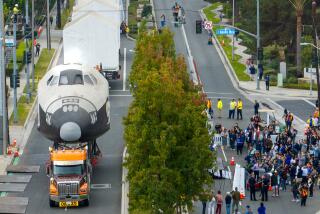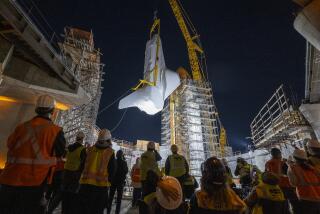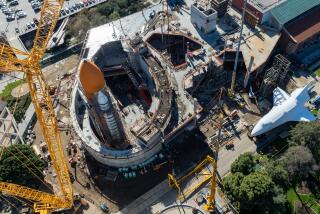Astronauts Retrieve Telescope, Shoot ‘Home Movies’
- Share via
KENNEDY SPACE CENTER, Fla. — The space shuttle Discovery’s astronauts Sunday retrieved an orbiting telescope loaded with nearly a week’s worth of star observations and shot some movie footage of themselves.
The retrieval of the 3 1/2-ton satellite was the crew’s last major job before returning to Earth on Tuesday and the only one conducted without a hitch.
“Oh baby! Oh baby! Oh baby!” astronaut Daniel Bursch exclaimed after grabbing the telescope with the shuttle’s robot arm. Crew member Carl Walz used the same expression at the end of his spacewalk last week.
“We’ll bring it home safely,” mission commander Frank Culbertson Jr. promised.
Bursch set the ultraviolet telescope free last Monday so it could study stars and interstellar gas, a job that would have been hampered if it had remained in the shuttle’s cargo bay.
About six dozen objects were observed, including stars up to 6 billion light-years away, said German astrophysicist Michael Grewing. “We’re in a party mood. This one’s for us,” said Stuart Bowyer, an astrophysicist at UC Berkeley.
Germany’s space agency funded most of the $80-million project.
The platform that carried the telescope is due to fly again next year on the shuttle Endeavour with different science instruments. The telescope is to fly again in 1995.
The platform also carried movie cameras. Before lowering the assembly into the bay, Bursch swept the 50-foot robot arm back and forth so the cameras could film Discovery from various angles.
“This is really impressive stuff,” replied Mission Control’s Gregory Harbaugh. “I can see that we’re going to all have to go to the movies when you guys get back.”
The scenes will be used in “Destiny in Space,” a giant-screen documentary film due out next year.
Before ending their eighth day in orbit, the astronauts turned off one of Discovery’s three electricity-generating fuel cells for 24 hours. NASA wants to see how easily the fuel cell restarts after being shut down, a process that would be necessary during a space docking.
The last time astronauts tried to shut down a fuel cell in orbit, in June, hydrogen kept flowing into the cell. This time, everything went well.
Discovery is scheduled to land at Kennedy at 2:30 a.m. PDT Tuesday. It would be the first shuttle touchdown there in darkness, although shuttles have landed in the dark at Edwards Air Force Base.
More to Read
Sign up for Essential California
The most important California stories and recommendations in your inbox every morning.
You may occasionally receive promotional content from the Los Angeles Times.













